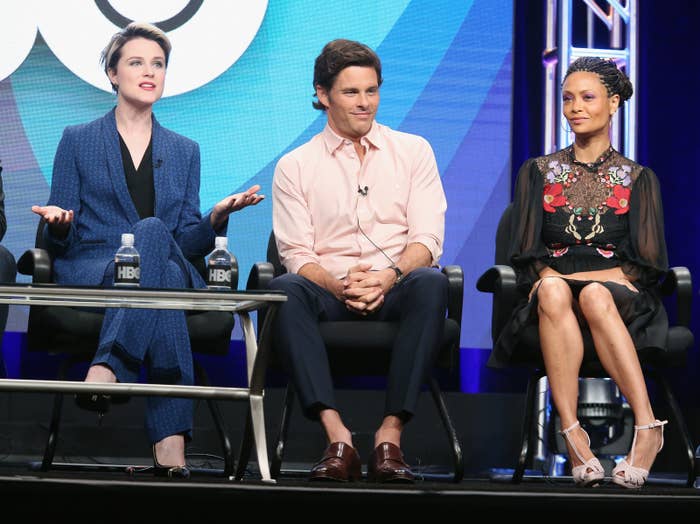
Westworld, HBO’s much-anticipated sci-fi series about a futuristic theme park where humans pay $40,000 to interact with lifelike robots, finally airs this Sunday. In the months leading up to the premiere, the show’s creators, producers, and even one top HBO executive have defended its fixation on sexual violence. Last night at a press event, actors Evan Rachel Wood and Thandie Newton, who both play artificially intelligent “hosts” who are repeatedly assaulted, also stepped in to defend the show, arguing that Westworld is both responsible and sensitive in its depiction of rape.
"You have an obligation as a storyteller to raise awareness and to show the horrors of that so that people aren’t desensitized to it. I don’t think there’s anything titillating about what we’re doing — it’s all horrific, as it should be," said Wood.
"We get to see the consequence and ramifications of this violence, the cost of this violence,” added Newton.
There’s only one rule in Westworld: Hosts can’t harm humans. Humans, on the other hand, can do whatever they want to the hosts, which can mean shooting them, stabbing them, and raping them. At the end of each day, the bots are patched up and their memories are mercifully wiped; the same Western-themed adventure starts anew the next morning.
In the first four episodes, the show does not depict rape onscreen. "We don’t actually show sexual violence towards women," Wood said. "You never see a scene of like rape or anything, but you know it’s going to happen." But the inanimate hosts emote and bleed just like humans, so it’s harrowing to watch them get treated like bystanders in a first-person shooter game.
Wood and Newton spoke at a roundtable discussion yesterday evening held at the Four Seasons hotel in Silicon Valley to promote Westworld, along with actor Jeffrey Wright, who plays the theme park’s head programmer, as well as the married couple behind the production, showrunners Jonathan Nolan (the brother of director Christopher Nolan) and Lisa Joy. Nolan’s previous works — he co-wrote the movie Interstellar and created the TV series Person of Interest — have also circled around artificial intelligence. With Westworld, he and Joy wanted to tell the story from the robot’s perspective and see what humans look like through their eyes.
“Morality isn’t a problem with video games because the simulation is poor enough that you don’t conflate the experience,” said Nolan. But, he added, “when the intelligence of the nonplayer characters that you’re interacting with eclipses a certain level, then it’s much more problematic than driving around in Grand Theft Auto and running over a bunch of pedestrians.”
Westworld is adapted from Michael Crichton's 1973 movie of the same name. But unlike Crichton's Jurassic Park, the threat here is more existential than physical. In the first episode, a line of code in a software update causes the hosts to remember brief flashes of the horrors that they have lived through, leaving the resort essentially “populated by 2,000 abuse victims and survivors, finally waking up,” Willa Paskin wrote in Slate.
Both executive producer J.J. Abrams and HBO president Casey Bloys have called the criticism about excessive sexual violence accurate and valid, but defended Westworld. “You can’t tell a story about oppression without depicting the oppressed," Abrams told reporters at the show’s premiere in Los Angeles earlier this week.
At the roundtable, Newton and Wood also acknowledged the horror of those scenes, but emphasized that the intent is to force the audience to contend with sexual violence.
“We’re also looking at it from so many different points of view, the perpetrator, the person who has been affected by it, the people who are complicit by being around it. I mean, when do you ever really get a narrative where you get to see it from those different points of view? I think that’s incredibly valuable, but the only way we can really look at it is by showing it," said Newton.
Newton also stressed there was nothing gratuitous about the sexual violence on the show. "It’s not like we’ll show you this then we’ll distract you and show you something else so you forgot that you’ve seen something so fucking disgusting, and that you don’t even have time to really sit with it and process it, and challenge it in your own mind,” she said. “I think it’s hugely responsible and sensitive filmmaking to first of all be brave enough to put this stuff out there, frankly. Because it’s the opposite of what we want to promote as a team."

